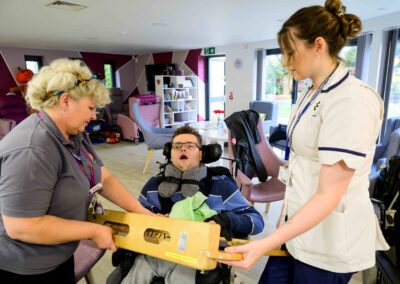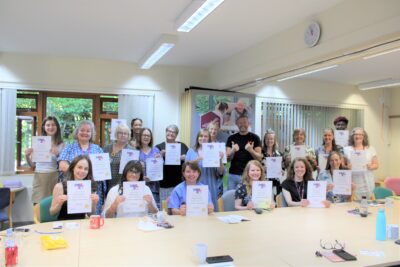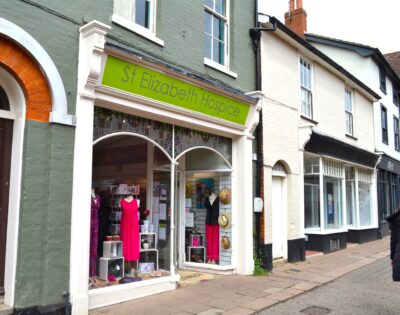Hospice care is different…. we treat body and mind, patients and families
St Elizabeth Hospice is known for its expert medical and nursing team, caring for people with progressive illnesses such as motor neurone disease, Parkinson’s, cancer and heart or kidney failure. Whilst medical treatments are vital in helping patients manage their conditions, the hospice takes a holistic approach, treating both the body and mind, bringing greater benefits to a person’s well-being and quality of life.
Verity Jolly, the hospice’s director of patient services, explains: “Receiving a diagnosis and treatments for a progressive illness often puts patients and their families on an emotional roller-coaster. There may be many worries and uncertainties that have to be faced and this can be a very stressful time for all concerned. It can be difficult for the patient and their families to talk openly about the effect it is having on them emotionally for fear of adding to the distress. For this reason we provide activities and therapies that are proven to increase communication and expression, providing emotional release, relaxation, enjoyment and comfort.”
Whilst the hospice offers the more usual services of physiotherapy, occupational therapy and complementary therapies like massage and reflexology, less familiar creative therapies are also available. Music and art therapists are state registered professionals and the therapists are both medically qualified and accomplished musicians and artists. St Elizabeth Hospice has both an art therapist, David Hardy, and music therapist, Ray Travasso. They each work with a wide range of people in small and large groups, or on a 1-2-1 basis, and sessions take place either at the hospice or in patients’ own homes.
Music and art therapy at St Elizabeth Hospice is not exclusive to the patients; it is a service that is offered to family members too. Children experiencing a loss of a parent, the spouse of a patient with an incurable condition – any member of the family who may be struggling to make sense of their situation can benefit from these creative therapies.
David Hardy explains: “When people are faced with a life-threatening situation they may feel that lots of options get closed down, but in fact they need to open up options and be more imaginative – music and art provide that outlet. It doesn’t matter if a person believes they are not creative; this is a common response which usually stems from our experience of music and art at school, which for many of us was a very long time ago! At the hospice we feel strongly that everyone is creative in something – writing, cooking, drawing, playing a musical instrument, gardening, running – these are all creative outlets that help free our minds and lift our spirits”.
Two people that have benefitted from creative therapy at St Elizabeth Hospice are Joanna and Kate. Joanna is a patient at the hospice who has regular music therapy sessions at home, whilst Kate attended art therapy following the loss of her husband. Here are their stories….
Joanna’s Story
Joanna Franklin is 26 years old and lives in Felixstowe with her family. The Franklin’s life is very different however to the majority of families who have older children still living at home.
Joanna rarely leaves the house – in fact she rarely leaves her bedroom. Her every need is attended to by her mum, supported by the family and her carer, 24 hours a day seven days a week.
Born with Down’s syndrome and Eisenmengers syndrome, Joanna was not always house-bound as mum Corrine explains: “Until Joanna was 14 she led a full and happy life. She attended school every day and was very much part of our family. She had a cheeky personality and was into everything.”
Unfortunately Joanna’s health began to deteriorate when heart and lung problems associated with her condition worsened. Joanna is now permanently connected to oxygen and only ventures out of the house for vital hospital appointments, or occasionally, if she is feeling up to it, the shops.
Mum Corrine says: “Joanna’s world has got smaller and smaller – to the point now where she has stopped going out. She used to love going to St Elizabeth Hospice for their Young Adult Group sessions where she could mix and have fun with other young people living with life limiting illnesses – but it is often too much for her to cope with. Life can be challenging and limiting with her illness, which can be frustrating for her and her emotions can swing dramatically – one minute she can be tearful, then angry, then happy. If it wasn’t for Ray’s home visits, we wouldn’t get to see glimpses of the old Jo, our fun girl.”
Ray, the hospice’s music therapist, is Joanna’s only contact with the outside world – apart from her families and carers – and what an impact he has on her life! His visits to the family home in Felixstowe put a smile on Joanna’s face and everyone else that happens to be in the room at the time. On a good day Joanna may manage to get downstairs for her music therapy session with Ray, but often he sets up a mini orchestra in Joanna’s bedroom – drums, keyboard, guitar, horns and a whole host of percussion instruments.
Ray said: “Music therapy is about connecting with Joanna, breathing life into her space, having fun and doing physical exercise. All music therapists believe that everyone is inherently musical and we all have an innate response to music. This is proven in Joanna’s reaction to her therapy sessions – she goes from being inactive and unreceptive to the point of absolute joy, cheekiness and interaction. While I’m singing and playing the guitar she will accompany me on the drums or maracas – sometimes she sits next to me while I am playing the piano and takes over the foot pedal. She loves to have her carer Marisa sitting close to her and by the end of the session it is good to see Joanna so relaxed and happy.”
Marisa, who has known Joanna since she was 15, is a firm advocate of music therapy having seen the positive impact it has on the Franklins. “Ray’s visits are so important to the family as it helps them connect with Joanna. Joanna loves making music with Ray and so does everyone else and music therapy gives her a chance to interact in a different way and to be animated, excited and explore a whole range of emotions and responses to the music and her audience. Sometimes the whole family join in and they video the session; Joanna loves to play-back the videos later on.”
The family’s time spent connecting with Joanna is precious as sadly her condition is progressive. The Franklin’s relationship with Ray and the hospice will become ever more important going forward, but for now they continue to enjoy making music with Joanna. The big grin on her face speaks volumes.
Kate’s Story
“I was one of those people who thought that you only go to a hospice to die”, said Kate Levick-Mason. “My husband Tim brought me to St Elizabeth Hospice to dispel that myth and it worked; it was completely different to what I had expected! I was amazed by the amount of light, the beautiful gardens and the relaxed and happy atmosphere. Many people come in for their treatment and then return home.”
Kate’s husband Tim had a long association with the hospice having been diagnosed with cancer 10 years earlier, a long time before they met. He was a staunch supporter and active fundraiser for the hospice and he was proud of his contribution to the extension to the day centre, enabling a better facility for patients.
After Tim and Kate married in August of last year, Tim proudly took Kate for a tour of St Elizabeth Hospice. Little did she know that four months later she would be back at the hospice but this time with Tim admitted as a patient. Kate said: “It was quite a shock for us as we had only been married for four months. The hospice allowed me to spend up to 12 hours a day by Tim’s bedside helping the nurses care for him – we were newlyweds and so in love, where else was I going to be? ”
Sadly Tim lost his fight against cancer and died peacefully at home with Kate by his side. During Tim’s time in the hospice, Kate developed a close friendship with the wives of the other three men on the ward, and they still regularly meet to support each other. One of the wives informed Kate about how art therapy was helping her and told Kate to get in touch with the hospice’s art therapist, David Hardy.
Kate said: “I had not done art since my school years and I had no idea what to expect. In the first session David and I just chatted. He identified that in terms of me losing Tim I had come to a place of acceptance but he saw that other things were interfering with my grieving process and so the decision was made for me to attend art therapy. I knew there was a place for it but I didn’t know how much of a place until that second session when all my emotions and frustrations came out on paper. It was a real surprise and I was shocked how much had been building up, but I also felt relieved and grateful that I had an outlet. What do people do if they don’t have an outlet?”
David explained: “I use my judgement and discretion to decide if art therapy will help someone. Immediately after bereavement is not usually a good time as feeling sad or bereft is part of the grieving process. Later on however, if someone wants help to articulate their feelings I can intervene.”
Kate’s sessions with David have now come to an end but her involvement in art has only just begun. She has armed herself with an abundance of oil pastels and paper and has signed up to a local art group to learn more. Kate concludes: “Creativity and pastels released what words could not express. You may not realise how much is inside and it has to have an outlet. I encourage anyone to try creative therapies – the release I now feel, and the peace from the deep Christian faith we both shared, says it all.”
If you, or someone close to you, have a life limiting or terminal illness – of if you are interested in helping support the hospice – please visit our website for further information: www.stelizabethhospice.org.uk
Art and Music Therapy Exhibition
St Elizabeth Hospice is holding its first Art and Music Therapy Exhibition tomorrow (Tuesday 4 October) featuring creative works of patients who have benefitted from art and music therapy.
The exhibition is open to the public from 6pm – 8pm and is being held in the hospice’s day centre in Foxhall Road, Ipswich.
There will be a combination of pieces of art and lyrics from songs patients and relatives have written on display; and Ray and David, the hospice’s art and music therapists, will be present to talk about the work they do. There will also be the chance for you to try your hand at art and music, with art materials and musical instruments available for you to use and play.
Find out more at www.stelizabethhospice.org.uk/events



